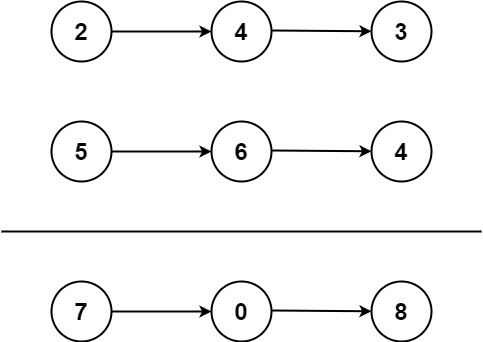Problem:
You are given two non-empty linked lists representing two non-negative integers. The digits are stored in reverse order, and each of their nodes contains a single digit. Add the two numbers and return the sum as a linked list.
You may assume the two numbers do not contain any leading zero, except the number 0 itself.
Example 1:

Input: l1 = [2,4,3], l2 = [5,6,4]
Output: [7,0,8]
Explanation: 342 + 465 = 807.
Example 2:
Input: l1 = [0], l2 = [0]
Output: [0]
Example 3:
Input: l1 = [9,9,9,9,9,9,9], l2 = [9,9,9,9]
Output: [8,9,9,9,0,0,0,1]
Constraints:
- The number of nodes in each linked list is in the range
[1, 100]. 0 <= Node.val <= 9- It is guaranteed that the list represents a number that does not have leading zeros.
Solution
public ListNode AddTwoNumbers(ListNode l1, ListNode l2) {
ListNode output = null;
ListNode outputCurrentNode = null;
ListNode currentNodeL1 = l1;
ListNode currentNodeL2 = l2;
var carry = 0;
var sum = 0;
while (currentNodeL1 != null || currentNodeL2 != null) {
if (outputCurrentNode != null) {
outputCurrentNode.next = new ListNode(0);
outputCurrentNode = outputCurrentNode.next;
} else {
outputCurrentNode = new ListNode(0);
output = outputCurrentNode;
}
sum = (currentNodeL1 != null ? currentNodeL1.val : 0) +
(currentNodeL2 != null ? currentNodeL2.val : 0) +
carry;
outputCurrentNode.val = sum % 10;
carry = (sum - outputCurrentNode.val) / 10;
if (currentNodeL1 != null) {
currentNodeL1 = currentNodeL1.next;
}
if (currentNodeL2 != null) {
currentNodeL2 = currentNodeL2.next;
}
}
if (carry > 0) {
outputCurrentNode.next = new ListNode(carry);
}
return output;
}